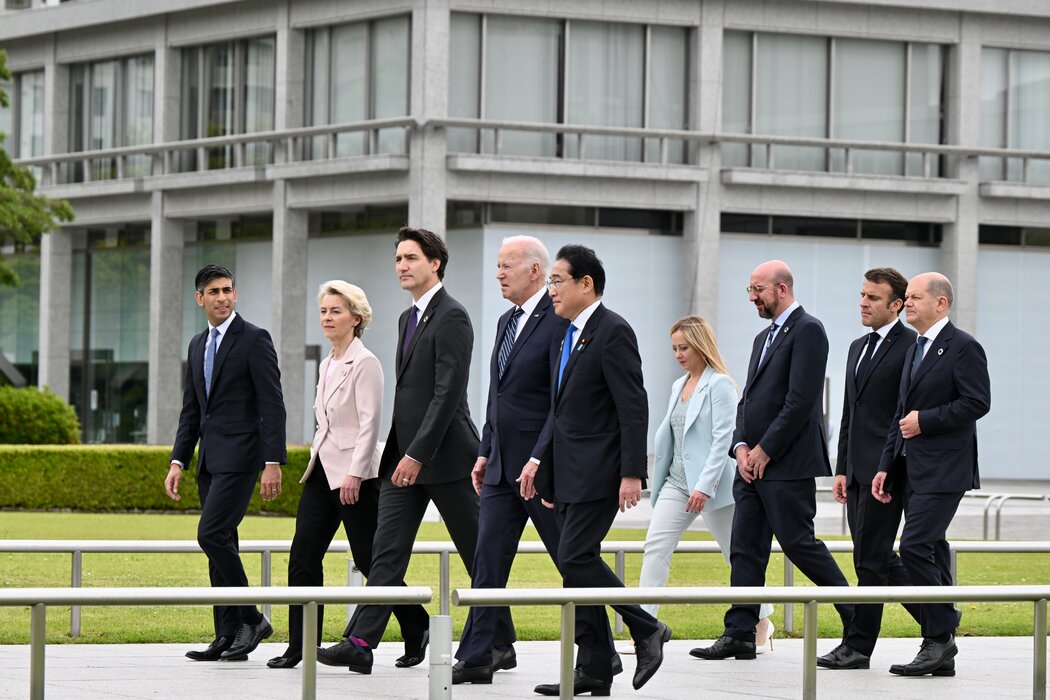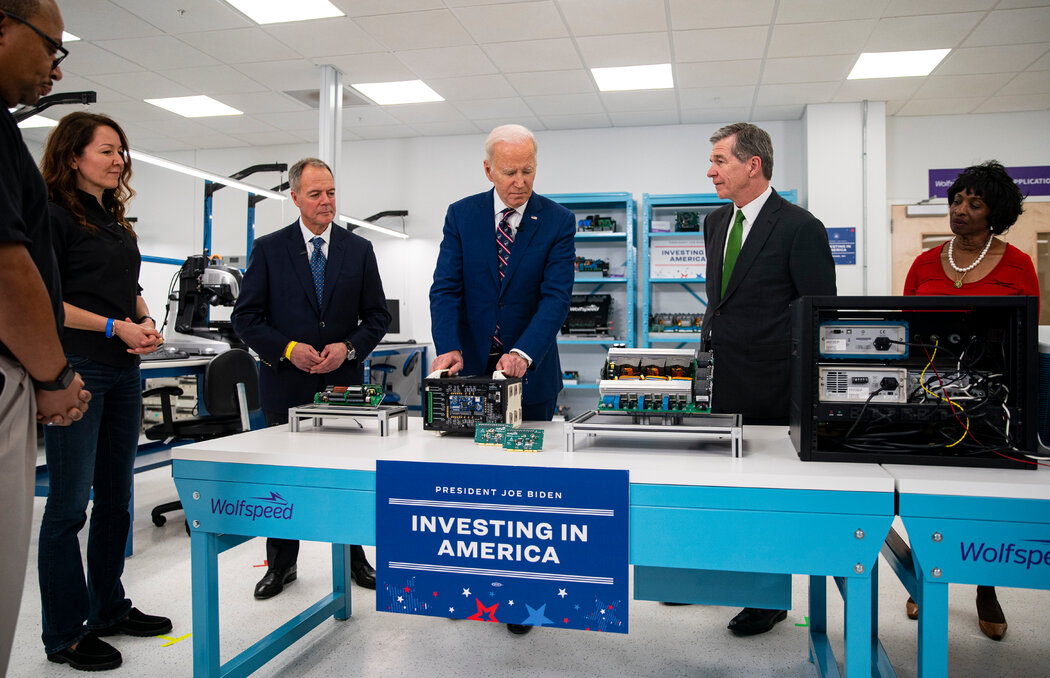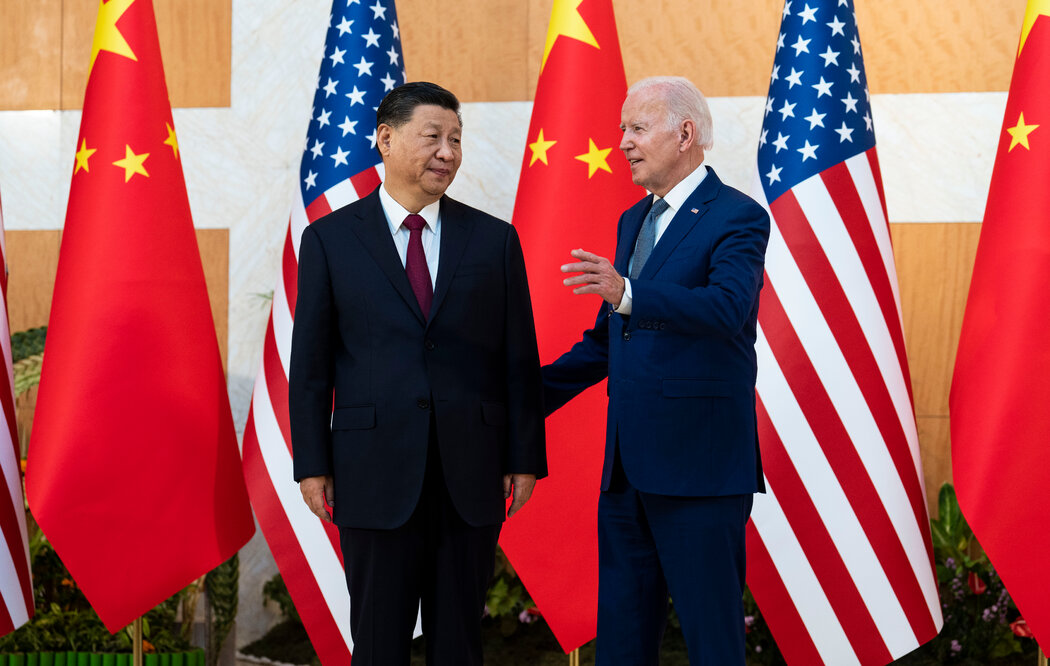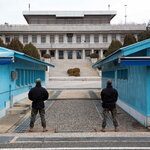为制衡中国,G7国家借鉴“中国经验”
To Counter China, G7 Countries Borrow Its Economic Playbook

Midway through his face-to-face meeting with President Biden in Indonesia last fall, the Chinese leader, Xi Jinping, offered an unsolicited warning.
去年秋天,中国领导人习近平与美国总统拜登在印度尼西亚举行会晤至一半时主动发出了一个警告。
Mr. Biden had in the preceding months signed a series of laws aimed at supercharging America’s industrial capacity and imposed new limits on the export of technology to China, in hopes of dominating the race for advanced energy technologies that could help fight climate change. For months, he and his aides had worked to recruit allied countries to impose their own restrictions on sending technology to China.
拜登抱着让美国在有助于应对气候变化的先进能源技术竞争中占据主导地位的希望,曾在此前几个月签署了一系列法律,旨在大力增强美国的工业能力、对向中国出口技术实施新的限制措施。几个月来,他和幕僚也一直在努力说服美国盟友在对华输送技术方面拿出自己的限制措施。
The effort echoed the sort of industrial policy that China had employed to become the world’s manufacturing leader. In Bali, Mr. Xi urged Mr. Biden to abandon it.
这一努力模仿了中国为成为世界制造业领导者所采取的产业政策。在巴厘岛与拜登会晤时,习近平敦促后者放弃这个做法。
The president was not persuaded. Mr. Xi’s protests only further convinced Mr. Biden that America’s new industrial approach was the right one, according to a person familiar with the exchange.
拜登不为所动。据一名知情人士表示,习近平的抗议只是让拜登进一步确信,美国的新产业方针是正确的。
广告
As Mr. Biden and fellow leaders of the Group of 7 nations meet this weekend in Hiroshima, Japan, a centerpiece of their discussions will be how to rapidly accelerate what has become an internationally coordinated round of vast public investment. For these wealthy democracies, the goal is both to reduce their reliance on Chinese manufacturing and to help their own companies compete in a new energy economy.
拜登和七国集团的其他领导人周末在日本广岛举行会议,他们讨论的核心内容将是,如何迅速加快一轮已带有国际协调性质的大规模公共投资。对这些富裕的民主国家来说,这轮投资的目标既是为了减少它们对中国制造业的依赖,也是为了帮助本国企业在新能源经济中竞争。
Mr. Biden’s legislative agenda, including bills focused on semiconductors, infrastructure and low-emission energy sources, has begun to spur what could be trillions of dollars in government and private investment in American industrial capacity. That includes subsidies for electric vehicles, batteries, wind farms, solar plants and much more.
拜登的立法议程,包括把重点放在半导体、基础设施和低排放能源的法案,已开始刺激政府和私人对美国工业产能可能高达数万亿美元的投资,包括政府对电动车、电池、风电场、太阳能发电厂等方面的补贴。
The spending — the United States’ most significant intervention in industrial policy in decades — has galvanized many of America’s top allies in Europe and Asia, including key leaders of the Group of 7. European nations, South Korea, Japan, Canada and others are pushing for increased access to America’s clean-energy subsidies, while launching companion efforts of their own.
作为美国几十年来对产业政策的最重大干预,这笔支出已激励美国在欧洲和亚洲的许多主要盟友,包括七国集团的主要领导人推动更多获取美国清洁能源补贴的机会。同时,欧洲国家、韩国、日本、加拿大和其他国家也在启动本国的配套努力。
“This clean-tech race is an opportunity to go faster and further, together,” Ursula von der Leyen, the president of the European Commission, said after an economy-themed meeting at the Group of 7 summit on Friday.
“这场清洁技术竞争是联合起来走得更快、更远的机会,”欧盟委员会主席冯德莱恩周五在七国集团举行的以经济为主题的峰会后说。
“Now that the G7 are in this race together, our competition should create additional manufacturing capacity and not come at each other’s expense,” she said.
“现在七国集团正一起加入到这场竞争中来,我们的竞争应该创造更多的制造能力,而不是以牺牲彼此利益为代价,”她说。

Mr. Biden and his Group of 7 counterparts have embarked on a project with two ambitious goals: to accelerate demand, even by decades, for the technologies needed to reduce emissions and fight climate change, and to give workers in the United States and in allied countries an advantage over Chinese workers in meeting that demand.
拜登和其他七国集团领导人已启动了一个计划,它有两个雄心勃勃的目标:一个是加快对减少碳排放、应对气候变化所需技术的需求,甚至加快几十年的时间;二是让美国和盟国的工人在满足这个需求上比中国工人更有优势。
Much of that project has roared to life since the G7 leaders met last year in the German Alps. The wave of recent Group of 7 actions on supply chains, semiconductors and other measures to counter China is based on “economic security, national security and energy security,” Rahm Emanuel, the U.S. ambassador to Japan, told reporters this week in Tokyo.
在七国集团领导人去年的德国阿尔卑斯山峰会后,这个计划的大部分内容已经启动。美国驻日本大使拉姆·伊曼纽尔上周在东京对记者表示,七国集团最近在供应链、半导体,以及其他针对中国所采取的诸多行动是以“经济安全、国家安全和能源安全”为基础的。
广告
He added: “This is an inflection point for a new and more relevant G7.”
他还说:“这是转向一个新的、更密切相关的七国集团的拐点。”
Mr. Emanuel said the effort reflected a growing impatience among Group of 7 leaders with what they call Beijing’s use of economic measures to punish and deter behavior by foreign governments and companies that China’s officials do not like.
伊曼纽尔表示,此举反映了七国集团领导人对他们所说的北京采取的惩罚做法越来越无法容忍,即中国官员通过经济措施来惩罚、阻止他们不喜欢的外国政府和公司。
But more than anything, the shift has been fueled by urgency over climate action and by two laws Mr. Biden signed last summer: a bipartisan bill to shower the semiconductor industry with tens of billions of dollars in government subsidies, and the climate provisions of the so-called Inflation Reduction Act, which companies have jumped to cash in on.
Those bills have spurred a wave of newly announced battery plants, solar panel factories and other projects. They have also set off an international subsidy race, which has evolved after being deeply contentious in the immediate aftermath of the signing of the climate law.
这些法案已刺激了一波新宣布的电池厂、太阳能电池板厂和其他项目。法案还掀起了一场政府补贴的国际竞赛,补贴问题曾在拜登刚签署了气候法案后极具争议,但后来发生了变化。
The lucrative U.S. supports for clean energy and semiconductors — along with stricter requirements for companies and government agencies to buy U.S.-made steel, vehicles and equipment — have put unwelcome pressure on competing industries in allied countries.
美国对清洁能源和半导体行业有利可图的支持——以及对公司和政府机构购买美国制造的钢铁、车辆和设备的更严格要求——已给盟友的同类行业带来了不想要的压力。

Some of those concerns have been quelled in recent months. The United States signed a deal with Japan in March that will allow battery materials made in Japan to qualify for the benefits of the Inflation Reduction Act. The European Union is pursuing a similar agreement, and has proposed its own $270 billion program to subsidize green industries. Canada has passed its own version of the Biden climate law, and Britain, Indonesia and other countries are angling for their own critical mineral deals.
最近几个月来,其中一些担忧已经平息。美国在今年3月与日本签署一项协议,让日本制造的电池材料有资格享受美国《通胀削减法案》的好处。欧盟正在寻求与美国签署一项类似的协议,并提出了自己的2700亿美元计划来补贴绿色产业。加拿大已通过了本国版本的拜登气候法案,英国、印度尼西亚,以及其他国家正在争取本国的关键矿产交易。
Administration officials say once-rankled allies have bought into the potential benefits of a concerted wealthy-democracy industrial strategy.
政府官员表示,曾经对美国法案不满的盟友们已接受了富裕的民主国家制定协调一致的产业战略可能带来好处的事实。
广告
At the Group of 7 meeting, “you will see a degree of convergence on this that, from our perspective, can continue the conversion of the Inflation Reduction Act from a source of friction into a source of cooperation and strength between the United States and our G7 partners,” Jake Sullivan, the national security adviser, told reporters on Air Force One as Mr. Biden flew to Japan.
在七国集团会议上,“你将看到在这个问题上有一定程度的趋同,从我们的角度来看,这能让我们继续把《通胀削减法案》从制造摩擦之源转变为美国与我们的七国集团伙伴合作和力量之源,”国家安全顾问沙利文随同拜登飞往日本时在“空军一号”上对记者说。
Some Group of 7 officials say the alliance has much more work to do to ensure that fast-growing economies like India benefit from the increased investments in a new energy economy. “It is important that the acceleration that is going to be created by this doesn’t disincentivize investment around the world,” Kirsten Hillman, the Canadian ambassador to the United States, said in an interview.
七国集团的一些官员称,在确保像印度这样的快速增长经济体从对新能源经济增加投资中受益方面,还有很多工作要做。“重要的是,随之而来的加速不会对全球其他地方的投资起抑制作用,”加拿大驻美国大使克尔斯滕·希尔曼在接受采访时说。
One country they don’t want to see benefit is China. The United States has issued sweeping restrictions on China’s ability to access American technology, namely advanced chips and the machinery used to make them. And it has leaned on its allies as it tries to enforce global restrictions on sharing technology with Russia, as well as China. All of those efforts are meant to hinder China’s continued development in advanced manufacturing.
Biden officials have urged allied countries not to step in to supply China with chips and other products it can no longer get from the United States. The United States is also weighing further restrictions on certain kinds of Chinese chip technology, including a likely ban on venture capital investments that U.S. officials are expected to discuss with their counterparts in Hiroshima.
拜登政府的官员已敦促盟国不要向中国施以援手,向中国提供其已无法再从美国获得的芯片和其他产品。美国还在权衡进一步限制某些类型的中国芯片技术的措施,包括可能的风险投资禁令,预计美国官员将在广岛与同行讨论这个问题。
Although many of the Group of 7 governments agree that China poses an increasing economic and security threat, there is little consensus about what to do about it.
尽管七国集团当中有不少国家认为中国构成了越来越大的经济和国家安全威胁,但在如何应对威胁上几乎没有共识。

Japanese officials have been relatively eager to discuss coordinated responses to economic coercion from China, following Beijing’s move to cut Japan off from a supply of rare earth minerals during a clash more than a decade ago.
日本官员们一直对讨论如何协调应对中国的经济胁迫上相对急迫,因为十多年前,中国政府曾在一次两国冲突期间采取行动,切断了日本的稀土矿产供应。
European officials, by contrast, have been more divided on whether to risk close and lucrative business ties with China. Some, like the French president, Emmanuel Macron, have pushed back on U.S. plans to decouple supply chains with China.
相比之下,欧洲官员对是否要冒险与中国建立密切且有利可图的商业关系上存在更大分歧。一些像法国总统马克龙那样的官员对美国在供应链上与中国脱钩的计划存在抵触。
广告
Ms. von der Leyen, the European Commission president, has been pushing for a “de-risking” of relations with China that involves recognizing China’s growing economic and security ambitions while reducing, in targeted ways, European dependence on China for its industrial and defense base. European officials said in Hiroshima that they had been pleased to see American leaders moving more toward their approach, at least rhetorically.
欧盟委员会主席冯德莱恩一直在推动对华关系的“去风险”,这涉及在承认中国不断增长的经济和国家安全野心的同时,有针对性地减少欧洲在工业和国防基础上对中国的依赖。在广岛出席会议的欧洲官员表示,他们很高兴地看到美国领导人正在更多地接受他们的做法,至少在口头上如此。
Still, the allies’ industrial policy push threatens to complicate already difficult relations with China. Consulting and advisory firms with foreign ties have been subject to raids, detainments and arrests in China in recent months. Chinese officials have made clear that they see export controls as a threat. Adopting the phase American officials use to criticize Beijing, the Chinese Embassy in Washington warned the Group of 7 this week against what it called “economic coercion.”
尽管如此,盟友推动产业政策的做法可能会让它们与中国本已困难的关系变得更加复杂。近几个月来,与外国有关系的咨询和顾问公司在中国受到突击搜查、拘留和逮捕的影响。中国官员已明确表示,他们视出口管制为一种威胁。中国驻华盛顿大使馆使用美国官员批评北京时用的说法,曾在上周警告七国集团不要对中国进行“经济胁迫”。
Mr. Xi issued a similar rebuke to Mr. Biden in Bali last fall. He pointed to the late 1950s, when the Soviet Union withdrew support for the Chinese nuclear program.
习近平曾在去年秋天在巴厘岛对拜登发出了类似的警告。他提到了当时的苏联在20世纪50年代后期撤走了对中国核武器项目的支持。
China’s nuclear research continued, Mr. Xi said, and four years later, it detonated its first atomic bomb.
中国在那之后继续核武器研发,并在四年后引爆了本国的第一枚原子弹。











